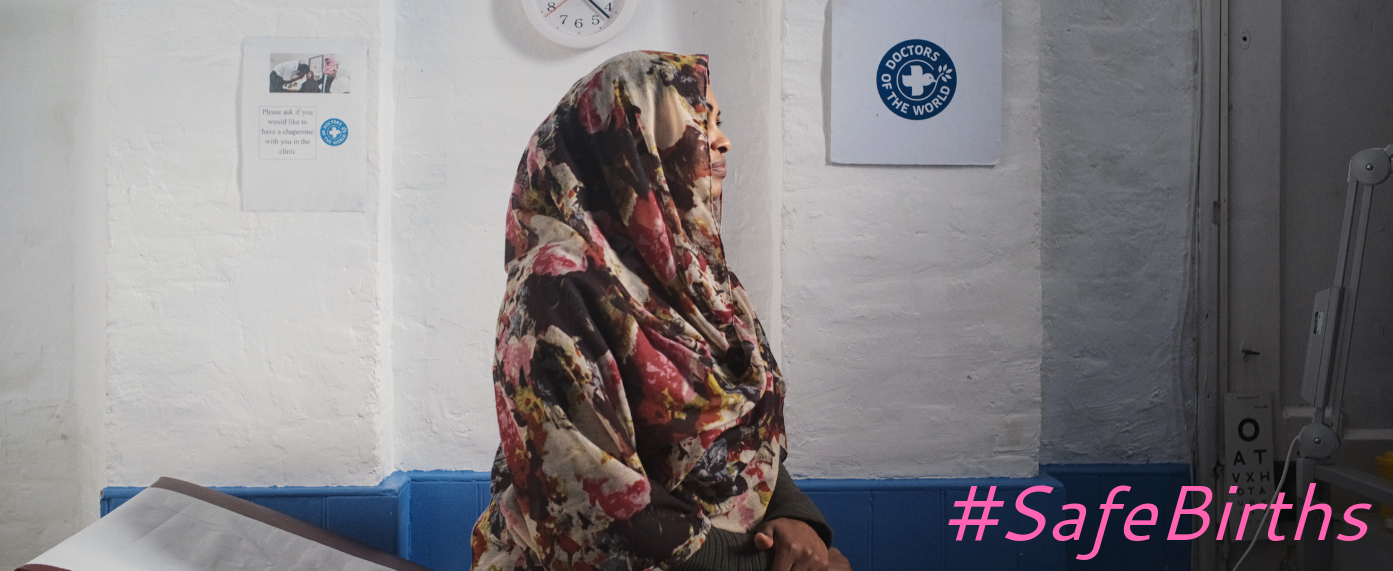Day Three #SafeBirths – Jennie
Published 28th November 2018
Over one year on, the government resists calls for transparency over harmful NHS charging regime
Jennie is the UK Policy and Advocacy officer at Doctors of the World.
The NHS is one of the most restrictive healthcare systems in Europe for migrants, with pregnant women, children and migrants on low incomes losing out the most, comparatively.
Since last year’s introduction of upfront charging and ID checks in secondary care (e.g. hospitals) in England, barriers have increased further still for migrants in vulnerable circumstances.
The NHS charging regime means that people who cannot pay inflated fees* in full have non-urgent treatment withheld.
At the Doctors of the World clinic, we regularly see how fear, administrative gatekeeping and poor practice prevent vulnerable people with urgent medical conditions from accessing the healthcare they need.
Pregnant women are a particular concern, as many women are too afraid to attend antenatal checks after receiving threatening bills they can’t hope to pay. This fear is made even worse by the fact that hospitals report unpaid bills to the Home Office to be used against patients in future immigration applications and potentially threatening their ability to remain in the UK.
“Sometimes I can’t sleep at night”
Even though the government ploughed ahead with the charging rules without any adequate assessment of their impact on vulnerable groups, pilots of routine ID checking were carried out in 20 English hospital trusts.
While the publication of an independent evaluation of these pilots was expected in December 2017, the government continues to resist calls to release any findings.
As part of the pilot evaluation, we shared eight cases from our clinic of pregnant women who had who accessed maternity services involved in the pilots. Most of the women were over 20 weeks pregnant and one was full term, without ever having accessed antenatal care. Together, they demonstrate clearly how fear of debts and being reported to the Home Office and stressful, often hostile, questioning about their immigration status prevent or delay timely treatment.
Two women required five consultations each with Doctors of the World caseworkers to encourage them to attend their hospital appointments. One woman, at 24 weeks pregnant, was (wrongly) told she would have to pay £6,500 before she could get an appointment. Another woman, a survivor of trafficking, worried how the stress caused might affect her baby:
“This is too much for me. Sometimes I can’t sleep at night.”
Like other measures under the ‘hostile environment’ agenda, the rules inevitably also impact on those who are fully entitled to NHS services, but because of their membership of a migrant or ethnic group, face discrimination. The case of Albert Thompson, who broke the Windrush scandal when he was denied cancer treatment, demonstrates how relying on hospital administrators to assess immigration status leads to ill-informed gatekeeping, with potentially life-threatening (and certainly discriminatory) consequences.
We demand transparency
Cases like the ones described above and that of Albert Thompson demonstrate the complex impacts of these rules. To maintain patient safety, prevent discrimination and effectively safeguard vulnerable individuals, a transparent understanding of the intended and unintended consequences of these new restrictions to healthcare access is essential.
Numerous MPs, including David Lammy and Caroline Lucas, have demanded the release of the pilot evaluation findings, but to no avail. We call on the government stop obscuring the impact of their policies on some of the most vulnerable people, to prioritise patient health and wellbeing and to demonstrate their commitment to preventing a repeat of the injustices done to the Windrush generation by publishing the evaluation report without delay.
*Charges are levied at 150% of the NHS tariff for any given service.
